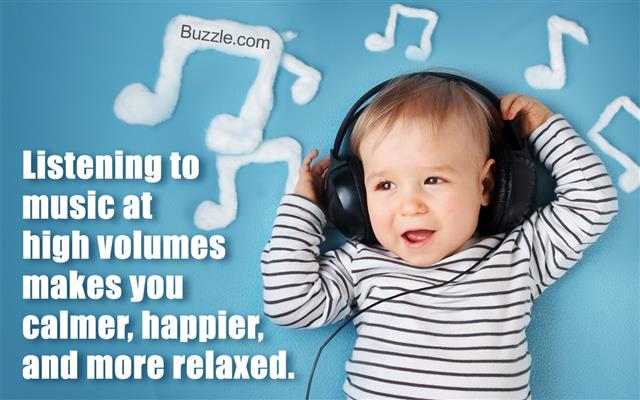
Amidst the fanfare that the modern world is so used to, there is a gloomy corner carved out of the side effects of the same modernity. Depression, anxiety, or lack of concentration seem to be the order of the day, but there is hope in the form of music.
Inside Your Brain!
A study was conducted to track patient’s ratings of their own anxiety. Before undergoing a surgery, they were randomly assigned to listen to music or take antianxiety pills.
The Outcome: Patients who listened to music had less anxiety compared to those who took pills.
Music has been an integral part of the human lifestyle from a long time. It is believed to have been a part of civilizations which existed 50,000 years ago. It is very interesting to note that music evolved as a means of expression, and hence, generally reflects the social, economic, environmental, religious, and other aspects related to humans. Thus, music was, and still is, a way to express a range of emotions and feelings. This process, in itself, has a great relieving effect and works wonders for the peaceful operation of the brain. When the mental faculty is provided a vent for its restless thought process, it automatically boosts the functioning of the brain and conclusively of all the other body processes.
Brain development is a method of training the thought process in such a way that it maintains proper working. There are two possible ways to understand the effect of music on the brain, namely general observation and scientific approach.
Effects of Music – General Observation
Universally Liked
The most important observation in this regard is that everybody likes some type of music. The fact that it is ‘liked’ by every person has a psychological effect on their mind. This makes music all the more loved! Moreover, music is seen to impart a pleasurable experience to the listener. When one listens to music, a part of the brain called the ventral striatum releases dopamine, which makes the experience pleasurable.
Self-Soothing
Music has a calming effect on our minds. During times of depression or anxiety, listening to music helps relieve our stress. People often de-stress themselves after a long day by listening to soothing music. The effect of music on the brain is analogous to spraying water on a dusty and hot land. Just as water settles the dust in the air, music acts as though layering the innumerable thoughts clogging your brain, thus de-stressing you.
Elevates and Energizes
Listening to music elevates one’s mood. It energizes a tired person, which is evident from the spike in the energy levels observed as a result of listening to one’s favorite music. Music influences one’s mood, and different kinds of music trigger different moods in people. For example, in a spa, soothing music is played, whereas in a pub, loud music is played. Both provide pleasure, but the kind of pleasure and mood generated is different. Music can calm your nerves and even make you go wild!
Alleviates Memorizing
Music is known to facilitate the learning process. This is why music is such an integral part in school. Children can easily grasp information in the form of a song. Even older students make their own little songs to remember difficult portions for their exams. Thus, music helps improve one’s memory and grasping power.
Exercise Motivator
There’s a strong association between fast-paced music and effective exercising. Music helps you take your mind off your aching muscles and motivates you to continue working out. The heart too, gets on to the music beats, making it easy for you to exercise to the fast music. Thus, thanks to music, your workout is transformed into a fun experience.
Promotes Immune Response
Cheerful music beats boost your immune system. How? The hypnosis or mental state created by these music beats sends the brain into an alpha state, where endorphins (happy hormones) are released. Thus, listening to soothing music is the simplest way to boost your immune response.
Creates a Meditative State
Since the time man existed, music has been a constituent of religious and spiritual traditions. For some, simply listening to spiritual music connects them with a higher power. Also, chanting hymns or drumming rhythmically takes you to an altered but alert cognitive state in which you are aware of yourself and your situation. People have been practicing this for thousands of years now as it helps them reach a trance-like meditative state.
Effects of Music – Scientific Observation
Serotonin Levels Upped
Problems like excessive worry, anxiety, or depression create a chaotic situation in the brain; it hampers its working power, reasoning ability, and execution of conventional tasks becomes difficult. It happens because of reduced levels of serotonin. Fifty million brain cells are affected by the levels of serotonin. Music effects a steep rise in the levels of serotonin, which has positive influences on brain cells controlling mood. Thus, music is often used to treat anxiety disorders.
Better Language Skills
Music therapy is used to help improve language skills in autistic children as well as enable them to express themselves more effectively. Music helps them communicate better, as these children often use songs to communicate. However, the extent to which music therapy is beneficial is not yet known. Autistic children are sensitive to sounds, but most respond positively to music.
Memory Recall
The words of a song and the tune often bring back memories, which even the brain seems to have forgotten. Every song has certain memories of fun and frolic or sorrow associated with it. However, the point is, songs are linked strongly to memories and playing the same songs again brings back certain memories to patients with Alzheimer’s. Thus, music therapy is used for patients with Alzheimer’s and dementia.
Music Therapy
In this intervention, music therapists chiefly help clients improve their health across various spheres. Music is used as a sanative to address the physical, emotional, cognitive, and social needs of a person. The intervention is designed to manage stress, relieve pain, promote wellness, express feelings, and promote physical rehabilitation among others. Music therapy is also found to be very effective in treating seizures, depression, ADD, insomnia, or conditions, like premature infancy.
Passive Listening and Music Training
Research conducted by Laurel Trainor (Director of the Institute for Music and the Mind at McMaster University in West Hamilton, Ontario) and his colleagues reveal that there is a difference between just passively listening to music, and being musically trained to play an instrument. The researchers found that children who
received training in some form showed greater brain responses as compared to those who just listen to music on a regular basis. They also go on to say that music training enhances a child’s concentration span and retaining capacity. This means that music training also helps cognitive functions, like learning and perception. Younger children who are given musical training are seen to develop motor, verbal, and non-verbal skills faster. However, this research was limited to children and did not extend to adults.
If knowledge is food for thought, music is the digestive system that makes sure that it is assimilated in a proper way. Music acts a great motivator, keeps you in a good mood, and although the jury is still out on this, listening to music surely doesn’t harm you. Simply venture out to the nearest coffee place that plays soft music or visit a loud club. The effect would be pretty clear!


































